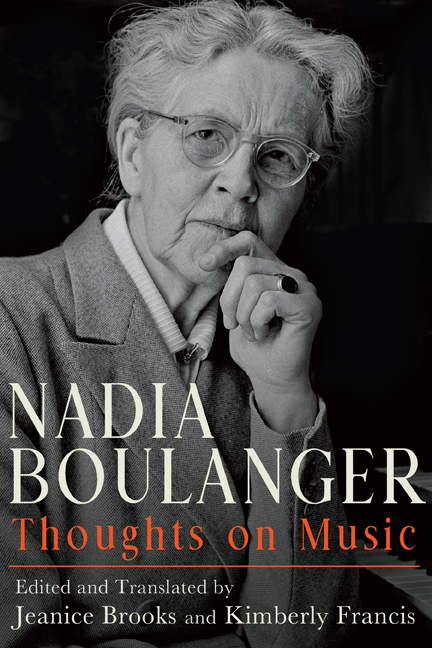Book contents
- Frontmatter
- Contents
- List of Illustrations
- Acknowledgments
- Editorial Apparatus and Critical Notes
- Note on Translations
- List of Abbreviations
- Timeline of Nadia Boulanger’s Life
- Introduction
- Part One Journalism, Criticism, Tributes
- Part Two Lectures, Classes, Broadcasts
- Bibliography of Nadia Boulanger’s Published Writing
- General Bibliography
- Index
“La Musique Et La Vie Quotidienne,” [Music and Everyday Life], The Listener 20, no. 515 (November 24, 1938), 1153 (complete text)
Published online by Cambridge University Press: 15 October 2020
- Frontmatter
- Contents
- List of Illustrations
- Acknowledgments
- Editorial Apparatus and Critical Notes
- Note on Translations
- List of Abbreviations
- Timeline of Nadia Boulanger’s Life
- Introduction
- Part One Journalism, Criticism, Tributes
- Part Two Lectures, Classes, Broadcasts
- Bibliography of Nadia Boulanger’s Published Writing
- General Bibliography
- Index
Summary
For musicians, music is such a necessity, such an inexhaustible source of joy, that it seems to them as if life would be different if music played a more daily, constant role in it. The radio has modified many values; it has notably abolished the notion of distance. It permits us to feel the presence of things that are absent; everyone, in their own homes, can have the music that artists enclosed in a small hall, or a small, faraway room, play for invisible listeners. There is no need to underline what this anonymous—from one side, at least—exchange contains that is moving and troubling. Can it be enough, and can everyone really benefit from it? Does everyone possess the minimum amount of knowledge without which no skills can develop? It is because words surround us from birth that we speak, and it is because we are told about colors that we learn to see them.
With music, things work entirely differently. What colors, lines, and dimensions are to painting, what language is to literature, sounds and rhythms are to music. And yet, it must be admitted, the majority of people, as intelligent and cultivated as they may be otherwise, remain ignorant concerning musical language, although, one should note that, without knowing it, the majority of people are ready to perceive it, they sense it, and they assimilate it easily.
Does this mean that everyone should be a musician? That is asking the wrong question. I believe that every child, from an early age, should truly learn how to discern sounds, rhythms, timbres, how to sing. This should absolutely be a widespread practice; and great efforts have been made elsewhere in this direction. It will never be too much. But, naturally, there will be those, more gifted, who find joy where others only encounter boredom. In no case is this a fault or a virtue. It is a way of being, because, naturally, not everyone is obliged to love music; but one can assume that knowledge develops interest, and that learning basic notions at least would prevent innate faculties from remaining uncultivated, and would develop instead an appreciation that can become a great source of happiness.
- Type
- Chapter
- Information
- Nadia BoulangerThoughts on Music, pp. 421 - 424Publisher: Boydell & BrewerPrint publication year: 2020



